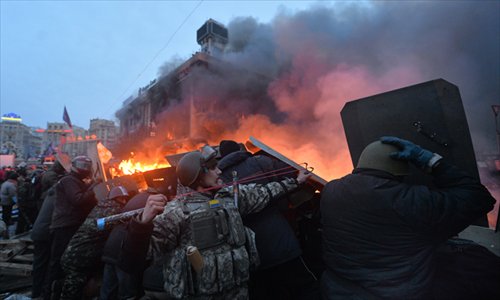HOME >> OP-ED
West-Russia rivalry bleeds Ukraine dry
Source:Global Times Published: 2014-2-20 0:23:01

An anti-government protester uses a slingshot during clashes with the police on Independence Square in Kiev early on Wednesday. Protesters, many of them masked and in battle fatigues, braced on Wednesday for a fresh assault by riot police in central Kiev after a day of clashes. Photo: AFP
The Ukrainian capital Kiev witnessed a fresh wave of violence on Tuesday. The opposition and police exchanged gunfire and threw fireworks in Independence Square, killing at least 16, including seven police officers.
Ukraine used to be the fourth wealthiest republic in the former Soviet Union, the collapse of which endowed it with an opportunity to gain independence but also opened a Pandora's box of ethnic conflicts between west and east Ukraine. The Orange Revolution in 2004 further framed the bleak scenario in the nation that split between pro-European regions in the west and Russia-oriented ones in the east. Since the democratic electoral system is unable to address what path the country should take, Ukraine is now dominated by street politics with parliamentary politics a mere supplementary tool.
After weathering a myriad of vicissitudes, its once developed economy has declined to a state of around $3,200 per capita GDP, approximately half of China's and one quarter of Russia's.
Russia has recovered at a relatively satisfactory pace under the leadership of Vladimir Putin since the collapse of the USSR. And separatism has also been hampered from further fomenting within Russian territory.
Nevertheless, it is Russia that suffers from notoriety in Western countries, but Ukraine and Georgia, which have been driven by turmoil, are hailed by Western public opinion. The West is extraordinarily warmhearted about the Ukrainian crisis and frequently interferes in its internal affairs by instigating the opposition party to challenge the incumbent government.
Some keep alleging that Ukraine will probably be split into two. If so, its population of 50 million will be gripped again by unimaginable torment. As the demarcation between the east and the west is difficult to define, no one can rule out a civil war in the future.
In recent years, countries that adopted Western-style democracy have taken on distinct destinies. Several East European nations like Poland, Hungary and the Czech Republic have enjoyed rather smooth transformations, while others either remain split or suffering perennial turmoil and upheaval. In addition, still other states such as Kazakhstan and Turkmenistan have revived owing to affluent resources and strongman politics. However, the West refuses to acknowledge them as democracies.
With its disintegration, the USSR that could once help resolve the contradiction between east and west Ukraine will help no more. In parallel, Western countries will not invest too much in Ukraine's peaceful transition because they could hardly gain any interest by maintaining its stability.
The external vicissitudes tell us that China must embark on a stable path of democracy by drawing lessons from other's mistakes.
If Beijing becomes so radical as to accept what the West asks us to do, there will be a high possibility that we experience a long-term turbulence with a split nation.
China's rejuvenation is doomed to be an arduous process of striving and reform and we have no other choice but to build a democratic and liberal country with Chinese characteristics.
Posted in: Editorial